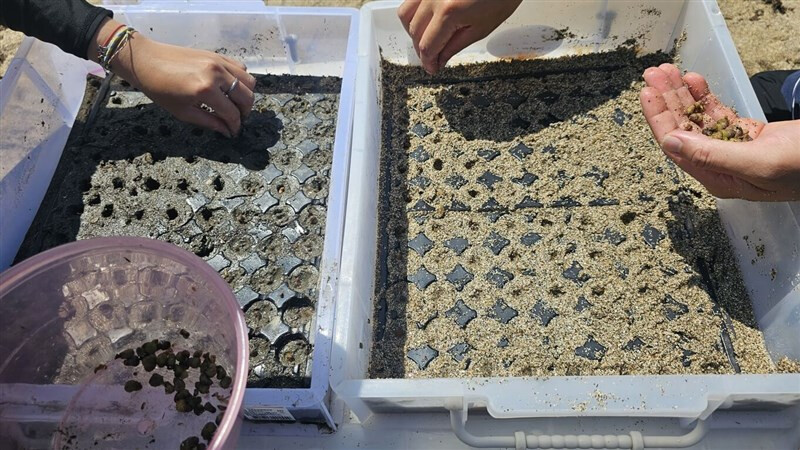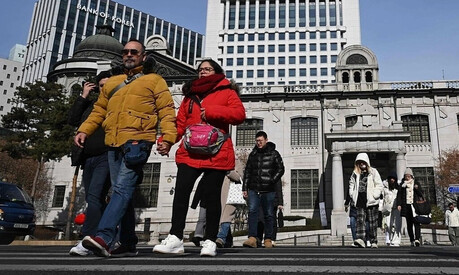
Taipei – A beacon of hope has emerged for the restoration of Taiwan's marine ecosystem. Environmental protection organizations have successfully completed a large-scale transplantation of endangered seagrass on Earth Day, marking a significant step forward in preserving marine biodiversity.
The Society for the Prevention of Cruelty to Animals (SPCA) in Taiwan announced on April 22nd that it had successfully transplanted 1,000 seagrass seeds collected from seagrass beds near Haikou Port in Pingtung County, the southernmost tip of Taiwan, to temporary cultivation sites. These seeds will eventually be relocated to the Fushan Fishery Resources Conservation Area in Taitung County and the damaged Haikou seagrass beds to aid in marine ecosystem restoration.
This seagrass transplantation project is a collaborative effort between the SPCA, the Eastern Marine Biology Research Center of the Fisheries Research Institute under the Council of Agriculture, and the Taitung County Fishermen's Association. Notably, the seagrass beds near Haikou Port, spanning approximately nine hectares, are known as the largest stable habitat in Taiwan and serve as a primary source for seed collection.
In an interview with the Central News Agency on April 23rd, SPCA Deputy Director Shih I-ju explained, "The transplanted seagrass is primarily Thalassia hemprichii, a species crucial for enriching marine biodiversity and serving as a vital food source for endangered sea turtles and dugongs." She further emphasized, "This transplantation is a crucial foundation for restoring damaged seagrass beds and, furthermore, for creating a healthy marine ecosystem."
Seagrasses play a vital role in coastal ecosystems. They produce oxygen through photosynthesis, provide habitats and food for diverse marine life, possess significant carbon absorption capabilities contributing to climate change mitigation, and act as natural breakwaters, reducing wave energy and preventing coastal erosion. However, seagrass beds worldwide have been rapidly declining due to coastal development, pollution, and climate change.
Taiwan is no exception. Seagrass beds that were once widely distributed have significantly shrunk due to environmental pollution and development pressures. Thalassia hemprichii, in particular, is known to be sensitive to changes in its habitat, leading to a notable decrease in its population. Recognizing the importance of conserving and restoring seagrass beds, the Taiwanese government and environmental organizations have been actively engaged in various efforts.
This large-scale seagrass transplantation is part of these efforts, aiming not only to plant seeds but also to promote the healthy growth of seagrass beds and enhance the resilience of the marine ecosystem in the long term. The transplanted seeds will undergo germination and initial growth in stable conditions at temporary cultivation sites before being transferred to the final restoration areas under the meticulous care of experts.
Researchers at the Eastern Marine Biology Research Center plan to analyze various environmental factors such as water depth, currents, and sediment in the transplantation areas to maximize the survival rate of the seagrass. Furthermore, the Taitung County Fishermen's Association will continuously carry out seagrass bed protection activities through the active participation and cooperation of local fishermen.
This achievement is expected to be a significant milestone in Taiwan's marine ecosystem restoration efforts. SPCA Deputy Director Shih I-ju expressed her aspirations, stating, "Starting with the transplantation of these 1,000 seeds, we will do our utmost to transplant even more seagrass in the future to revitalize the damaged marine ecosystem and pass on a rich sea to future generations."
Meanwhile, the Taiwanese government is making multifaceted efforts to protect marine ecosystems, including seagrasses, by strengthening relevant laws and regulations and expanding marine protected areas. It is also focusing on raising public awareness of marine ecosystem conservation through marine environmental education and outreach activities. This successful seagrass transplantation is a valuable result of collaboration between the government and private organizations and is expected to positively impact Taiwan's marine ecosystem conservation policies in the future.
Furthermore, this case offers important implications for other countries striving to restore marine ecosystems. Ecosystem restoration efforts based on scientific research and active community participation are essential elements in preserving global marine ecosystems threatened by global warming and marine pollution. It is hoped that Taiwan's successful seagrass transplantation case will spread globally and contribute to creating healthy and abundant marine ecosystems.
[Copyright (c) Global Economic Times. All Rights Reserved.]





























